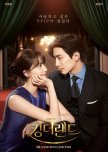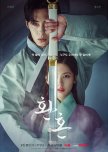
The Timeless Love and Tragic Fate of Goblin: A Captivating Journey Between Life and Death
Goblin, also known as Guardian: The Lonely and Great God, is one of South Korea's most beloved and critically acclaimed dramas. The show is a magical mix of fantasy, romance, and deep introspection, crafted with brilliant direction by Lee Eung-bok and writing by Kim Eun-sook. With stunning cinematography, captivating performances, and a gripping storyline, it certainly deserves its massive following. But, despite all the praise, there are a few aspects of the series that leave room for improvement.At the heart of Goblin is the immortal goblin Kim Shin (Gong Yoo), whose tragic past haunts him as he waits for his "bride," Ji Eun-tak (Kim Go-eun), to appear and end his curse. The premise alone is intriguing—mixing elements of fantasy with real-world struggles like love, loss, and redemption. The blend of romance, humor, and deep melancholy makes Goblin a rollercoaster of emotions that often hits hard. In particular, the love story between Kim Shin and Ji Eun-tak is tender and sweet, with the chemistry between Gong Yoo and Kim Go-eun being palpable and natural. The emotional depth of their connection is one of the key strengths of the show, drawing viewers into their world of fate, longing, and painful goodbyes.
However, as much as Goblin is praised for its character development and romantic tension, the series does falter in a few areas. The pacing, for instance, feels uneven at times. While the first half of the drama is tight, with a steady build-up of character dynamics and plot development, the latter episodes begin to drag. Some subplots, particularly those involving the grim reaper (Lee Dong-wook) and Sunny (Yoo In-na), though charming, seem to meander and distract from the main narrative, which at times feels more like filler than essential storytelling. The fact that some of the key emotional moments feel overly drawn-out can make the series feel like it’s treading water toward the end.
Another aspect that can be a bit off-putting is the treatment of the secondary characters. While the grim reaper and Sunny’s subplot is enjoyable and offers comic relief, it also feels a bit forced at times. Their romance, while sweet, doesn’t have the same emotional depth or development as the main love story, and it occasionally pulls attention away from the central, more poignant themes of the drama.
Visually, Goblin is stunning. The cinematography is beautiful, and the production values are top-notch. Each scene is meticulously crafted, capturing the grandeur and sorrow of Kim Shin’s immortal life. The use of color, lighting, and camera work are all designed to enhance the mood of the show, and it does so effectively. The show’s soundtrack, including the hauntingly beautiful "Stay With Me" by Chanyeol and Punch, adds a layer of emotion to each scene, making it all the more impactful.
While Goblin undoubtedly shines in its themes of fate, love, and sacrifice, it sometimes leans too heavily on its fantastical elements, to the detriment of a tighter, more grounded narrative. The philosophical musings about life and death are thought-provoking but occasionally come off as overly sentimental or preachy, especially as the show gets deeper into the mystical aspects of its plot.
Overall, Goblin is a beautiful, emotionally-charged drama that is undoubtedly worth watching. The chemistry between the leads, the breathtaking visuals, and the poignant exploration of life, love, and death make it stand out. However, the pacing issues and occasionally forced subplots prevent it from being a flawless masterpiece. The emotional payoff is significant, but the journey to get there may feel long and at times overly meandering.
If you're a fan of romantic fantasy dramas with rich character development and thought-provoking themes, Goblin will likely resonate with you. However, be prepared for some moments that feel overly drawn-out or unnecessary, especially if you're more into fast-paced, plot-driven storytelling. Despite its flaws, Goblin still manages to capture the hearts of its viewers, making it a memorable and visually stunning series.

A Dark Dive into Fate and Choices
Karma, the South Korean crime-thriller series released on Netflix on April 4, 2025, offers a gripping exploration of interconnected lives and the inevitable consequences of our actions. Adapted from Choi Hee-seon’s webtoon Akyeon, the show captivates with its complex narrative and psychological depth, pulling the audience into a web of moral ambiguity.The series follows six distinct characters, each navigating their own personal battles with past mistakes and the weight of their decisions. Whether it’s a man who witnesses a life-changing accident, a doctor facing unresolved trauma from her childhood, or a desperate individual sinking deeper into financial ruin, the show presents a kaleidoscope of human experiences. What makes Karma stand out is how these individual stories intertwine, building a larger picture of fate and consequence. The theme of karma is ever-present, with characters’ wrong choices haunting them in often tragic ways. This makes for an emotionally intense viewing experience that questions the nature of fate and whether we can ever truly escape our past.
The performances in Karma are one of its strongest aspects. With an ensemble cast that includes Park Hae-soo, Shin Min-a, Lee Hee-joon, and others, the actors bring their characters to life with remarkable depth and authenticity. Their portrayals allow the audience to empathize with even the most morally ambiguous characters, making the emotional impact of the series all the more powerful.
Directed by Lee Il-hyung, Karma is a testament to the power of storytelling in the thriller genre. It mixes suspense, moral dilemmas, and a sense of inevitable fate to create a show that leaves a lasting impression. The show’s narrative is unpredictable, with twists and turns that keep viewers on the edge of their seats. Despite the dark themes, the series also offers a subtle commentary on human nature, redemption, and the idea that perhaps, we are all bound to face the consequences of our choices in the end.
Personally, I found Karma to be an intense but thought-provoking watch. It wasn’t just the twists and suspense that kept me hooked—it was the deep dive into human nature and the exploration of how even small decisions can alter the course of our lives. The theme of fate versus free will is a constant undercurrent throughout, making me reflect on my own choices and how interconnected our lives really are. While the tone is dark and the stakes feel high, there’s a rawness to the characters that feels very real, and that’s what makes the series stand out. It wasn’t just about the shocking twists; it was about the emotional and moral weight of every action.
If you’re someone who enjoys shows that not only entertain but also make you think deeply about life and fate, Karma will not disappoint. It left me with lingering thoughts about the fragility of our choices and the way the past continuously shapes our present.

Not So Hidden Anymore: A Love That Finds Its Way
The central plot of Hidden Love revolves around Sang Zhi, a young woman who has secretly admired Duan Jia Xu, her older brother’s friend, for many years. As Sang Zhi matures, her feelings for Duan Jia Xu grow deeper, and she finds herself unable to hide her affections any longer. On the other hand, Duan Jia Xu is initially unaware of her romantic feelings. However, as they spend more time together, their bond begins to shift from friendship to something more intimate.Despite the connection between them, their love must remain hidden due to the social and familial pressures around them. Their relationship cannot be openly acknowledged, and both characters struggle with the consequences of keeping their feelings secret. The tension in the show comes from their ongoing battle to navigate these constraints while dealing with the emotional weight of their hidden love.
While the premise offers a lot of potential for emotional depth and intrigue, the pacing of the story falters at times. Some episodes feel drawn out, particularly when the characters spend significant time apart or misunderstand each other. These pacing issues sometimes hinder the story's emotional impact, as the buildup to key moments can feel slow or repetitive.
Sang Zhi (played by Zhao Lusi) is the female lead, and she is depicted as sweet, shy, and deeply emotional. Zhao Lusi does a wonderful job of portraying Sang Zhi's internal conflict as she tries to balance her growing feelings for Duan Jia Xu with her fear of rejection and the pressure of societal norms. Her character is easy to empathize with, as she struggles to make her love known while grappling with the knowledge that it cannot be fully reciprocated in public. Although Sang Zhi does experience some growth, her character arc is sometimes held back by the story's reliance on common romantic tropes.
Duan Jia Xu (played by Chen Zheyuan) is the male lead, a charming yet somewhat reserved character who finds himself slowly falling for Sang Zhi, even though he initially seems unaware of her feelings. Chen Zheyuan plays Duan Jia Xu with a mix of aloofness and sincerity, but his character development sometimes feels secondary to that of Sang Zhi. Duan Jia Xu’s emotional growth is less pronounced, and his reactions to certain plot developments can seem more passive compared to Sang Zhi’s active role in the story. His emotional journey feels slightly underdeveloped, which makes it harder for viewers to deeply connect with him.
While both leads have chemistry, their romance can feel one-dimensional at times. The lack of substantial growth in Duan Jia Xu’s character arc limits the emotional payoff of their relationship. Their love story, though heartfelt, is often bogged down by misunderstandings and a reliance on overly familiar romantic tropes, which makes it feel less fresh.
Supporting characters in Hidden Love also play important roles in moving the plot forward, especially Sang Zhi’s family and friends, but these secondary characters are given limited screen time and character development. They serve mostly to support the leads, without adding much depth to the story itself.
The cinematography in Hidden Love is one of its strongest points. The show features beautiful, soft lighting and scenic locations that evoke a sense of warmth and nostalgia. The visuals enhance the tender tone of the series and help to underline the emotional undercurrents of the romance. The gentle color palette, combined with intimate close-ups, draws the audience into the personal world of Sang Zhi and Duan Jia Xu.
However, while the visuals are aesthetically pleasing, they sometimes feel more like a distraction from the deeper emotional struggles the characters face. The beauty of the show occasionally overshadows the emotional complexity that could make the romance more impactful. As a result, the emphasis on style can feel superficial, especially when the characters’ inner journeys are not fully explored.
At its heart, Hidden Love is a story about love that must be concealed due to external pressures. It explores the emotional cost of keeping a relationship hidden, the sacrifice of not being able to express love openly, and the toll that secrecy takes on the characters involved. Both Sang Zhi and Duan Jia Xu must learn how to navigate their feelings within the constraints of their environment, which adds an emotional layer to the story.
Despite the potential for a deeper exploration of these themes, the show does not fully capitalize on the complexity of secrecy and the consequences it has on the characters’ emotional growth. The tension around their hidden relationship is not always explored in ways that make it truly transformative. Although the themes of love, loyalty, and longing are central to the narrative, they are not delved into with the depth that would make the characters’ journey feel more poignant.
Hidden Love is an enjoyable watch for fans of light romantic dramas, offering a tender portrayal of forbidden love. The performances of Zhao Lusi and Chen Zheyuan are solid, and the chemistry between the two leads is evident. However, the series falls into some common tropes and pacing issues, which prevent it from reaching its full potential. While the romance is sweet, it often lacks the emotional depth needed to make the relationship feel truly transformative.
For those who enjoy sweet, visually pleasing romantic dramas, Hidden Love will be a satisfying experience. However, viewers seeking more complex, emotionally resonant storytelling may find the series lacking in substance.

King the Land: Where Heartfelt Romance Meets Hilarious Chemistry
Set in a luxurious hotel, the series revolves around a wealthy heir, who is uninterested in his family business, and a bright, hardworking woman who ends up becoming a hotel employee. The contrasting personalities of the leads create a perfect setup for a heartwarming and engaging story.The plot follows the development of their relationship as they navigate workplace dynamics, personal differences, and family expectations. While the story is not groundbreaking, it offers a satisfying mix of humor and heart. The romantic tension between the leads builds gradually, and their interactions are filled with sweet moments that keep viewers invested in their journey.
What truly sets King the Land apart, however, are the performances. The lead actors have incredible chemistry, making their developing relationship both believable and endearing. Their ability to effortlessly switch from comedic to emotional moments is impressive, creating a compelling dynamic that drives the show. The supporting cast also contributes strongly to the overall charm of the series, providing a well-rounded and enjoyable viewing experience.
The pacing of the show is generally steady, though there are moments where the storyline can feel a bit predictable. Despite this, the characters’ growth, both individually and together, is engaging enough to keep viewers hooked. The setting of the hotel adds a touch of glamour and luxury, which adds to the overall appeal of the show.
While King the Land might not break new ground in the rom-com genre, it does what it does best—offering an entertaining and heartwarming story, enhanced by strong performances and relatable characters. If you’re a fan of romantic comedies with a dash of humor and warmth, King the Land is a delightful pick.

The Strength Found in Vulnerability
Weak Hero Class 1 takes you into the heart of high school bullying, the ugly side of adolescence, and the raw, unspoken pain that students often face. On the surface, it might seem like yet another story about tough kids fighting and vying for power. But beneath that, it’s a poignant exploration of the fragility of youth, the toll of trauma, and how strength often comes from the most unlikely places.The story follows the life of Yeon Shi Eun, a seemingly weak and introverted student who doesn’t fit in with the aggressive, often brutal environment of his school. He’s small, fragile, and doesn’t physically stand a chance against the bullies that run rampant. However, as the series progresses, we learn that his greatest strength doesn’t lie in physical power but in his intelligence, strategic thinking, and deep empathy. Shi Eun doesn’t fight with his fists; he fights with his mind and, often, his heart.
What makes Weak Hero Class 1 stand out is its raw portrayal of bullying. It doesn’t sugarcoat or glamorize the violence and pain that the characters experience. It shows how, for many students, high school can feel like a battlefield—where alliances shift, vulnerabilities are exposed, and survival often means being ruthless. Shi Eun’s resilience lies in his ability to understand people and use their weaknesses against them, but what makes his journey particularly moving is how he refuses to become like the people who torment him. In a world where showing vulnerability is a weakness, Shi Eun’s empathy is his strength.
The supporting characters add much-needed depth to the narrative, each dealing with their own issues and struggles. You see how different people cope with their environment: some respond with aggression, while others try to keep their heads down. As the story progresses, we get to understand their motivations, and we learn that no one is truly "weak"—everyone has their reasons for behaving the way they do.
The pacing is tight, and the tension is palpable. Every scene feels charged with emotion, whether it’s a fight sequence or a quiet moment of introspection. The cinematography is stark, matching the cold and harsh tone of the story. It’s a world where every moment could be a turning point, where the smallest action can tip the balance between survival and destruction.
At its core, Weak Hero Class 1 is about understanding that true strength isn’t always about being physically imposing. Sometimes, the strongest people are the ones who’ve been broken down and yet continue to rise. The series encourages viewers to look beyond the surface and see that even the most vulnerable can possess extraordinary power. It’s a tale of resilience, survival, and the quiet strength that comes from being true to yourself in a world that often demands conformity.

A Youthful Tale of Strength, Softness, and Self-Love
Some dramas don’t just entertain you—they embrace you. Weightlifting Fairy Kim Bok Joo is one of those rare gems that feels like a warm hug. It tells the story of Kim Bok Joo, a talented weightlifter navigating the confusing, beautiful mess of youth—first love, friendship, family pressure, body image, and most importantly, self-acceptance. Wrapped in humor and sweetness, this drama manages to be both light-hearted and deeply moving.Kim Bok Joo is a breath of fresh air. She’s strong, not just physically but emotionally too—though she doesn’t always realize it. What makes her so lovable is her honesty, her goofiness, her quiet insecurities, and the way she carries the weight of her dreams—literally and figuratively. She’s not your typical K-drama heroine. She’s not overly polished, nor is she portrayed as some flawless “girl next door.” Instead, she’s real. She sweats. She eats with joy. She struggles with her image. And she learns, slowly and tenderly, to love who she is.
The drama beautifully explores the tension between societal expectations of femininity and Bok Joo’s identity as a female weightlifter. Her journey isn’t about becoming more “ladylike”—it’s about embracing her strength while also giving herself permission to be soft, to fall in love, and to be vulnerable. Her story reminds us that there’s no single way to be a woman, and that our power doesn’t have to come at the expense of our sensitivity.
Nam Joo Hyuk’s character, Jung Joon Hyung, is the perfect counterpart to Bok Joo. He doesn’t just fall in love with her charm—he sees her. He cheers for her in ways that matter, laughs with her, teases her, and most importantly, gives her space to be herself. Their romance is slow-burn, rooted in friendship, and full of those small, heartfelt moments that feel more real than grand gestures ever could. It’s a relationship built on trust, support, and mutual growth.
Beyond the love story, the series shines in its portrayal of friendship. The camaraderie between Bok Joo and her teammates is vibrant and hilarious, grounded in years of shared experiences. It shows how deeply women can love and uplift one another—even in a competitive environment. The familial dynamics, too, are sincere and touching, especially the relationship between Bok Joo and her father, a humble chicken restaurant owner who wants the best for his daughter but doesn’t always know how to show it.
The cinematography is soft and youthful, the soundtrack full of nostalgic energy, and the pacing allows every emotional beat to breathe. There’s no excessive drama here—just life, in all its awkward, funny, and heartfelt glory.
Weightlifting Fairy Kim Bok Joo is ultimately a celebration of girlhood in all its messy, radiant forms. It tells you it’s okay to not have everything figured out, to cry, to try again, to grow. And perhaps most importantly, it whispers gently but firmly: you are enough—as you are.

The First Frost: Finding Love and Closure in the Cold
The First Frost is a touching and heartfelt series that explores themes of love, loss, and second chances. Set in a small town with a picturesque winter backdrop, the show brings together a mix of romance and personal growth as it follows the lives of its characters navigating life’s challenges. The central story revolves around a woman who returns to her hometown after a long time, reconnecting with old friends and rekindling past relationships while facing unresolved emotional baggage.The strength of The First Frost lies in its rich character development. The lead character’s journey is both compelling and relatable, as she works through the complexities of her past while trying to make peace with her present. The romantic elements of the story unfold slowly and realistically, making it easy for viewers to connect emotionally with the characters. The chemistry between the leads is palpable, and their evolving relationship adds depth to the plot.
The small-town setting plays a crucial role in the series. It serves as a beautiful backdrop that not only enhances the romantic atmosphere but also reflects the inner struggles of the characters. The show’s pacing is steady, and while it’s not overly fast-paced, the slow build-up helps develop a deeper emotional connection with the characters and their stories.
One of the highlights of the series is its ability to balance light-hearted moments with more serious, emotional themes. It doesn’t shy away from dealing with difficult subjects, such as grief and regret, while still offering moments of hope and healing. This balance is one of the reasons the show is so engaging and emotionally impactful.
However, while the story is heartwarming, there are moments when the plot feels a bit predictable. Some of the twists in the story are easy to anticipate, and the pace can sometimes feel slow. Still, the charm of the characters and their personal growth is enough to keep viewers invested.
In conclusion, The First Frost is a beautiful exploration of love, forgiveness, and starting over. It’s a series that doesn’t rush its story but takes its time to let characters evolve and grow. While it may have some predictable moments, its emotional depth and the relatable journey of its characters make it a worthwhile watch for those who enjoy heartfelt dramas.

A Beautiful Blend of Romance and Realism
The series focuses on the lives of its characters, offering a profound look at the complex relationships, personal struggles, and societal expectations they face. It stands out for going beyond typical rom-com tropes to delve deeper into human emotions.The story centers around the main character, played by Gong Hyo-jin, a strong and independent single mother who is navigating her journey of healing. After facing numerous challenges in her past, she strives to provide a better future for her child. The character’s development is compelling, making her relatable and multidimensional. The romance that develops between her and a local police officer is sweet and heartfelt, but the show doesn’t shy away from the difficulties they face, both individually and as a couple.
The secondary characters are equally well-developed, adding rich layers to the plot. The small town setting and the community of characters, each with their own struggles and stories, create a dynamic and engaging atmosphere. The relationships, whether romantic, familial, or platonic, feel authentic, which is a key strength of the series.
Gong Hyo-jin’s performance is one of the highlights of the show. She brings a depth to her character that makes her both strong and vulnerable at the same time. The chemistry between her and Kim Ji-seok, who plays the love interest, is undeniable, and their interactions create some of the most touching moments of the series.
Directed by Cha Young-hoon, the show captures the charm of the small town while exploring the emotional journeys of its characters. The pacing is well-balanced, blending humor and drama effectively, though there are moments where the series feels slow, particularly in the middle episodes. Some conflicts could have been resolved more quickly, and at times, the story seems to drag without significant progression.
Personally, I appreciated how When the Camellia Blows subverts expectations. While it could easily be categorized as a romantic drama, it also addresses real-life struggles in a way that feels honest and unpretentious. It doesn’t just focus on the ‘will they or won’t they’ aspect of the romance but also explores themes like being a single mother, dealing with societal judgment, and discovering one’s own self-worth. The show’s strength lies in its grounded approach, offering an uplifting story that resonates on a deeper level.
However, I found some moments in the middle of the series to be a bit slow-paced, and some conflicts could have been resolved more efficiently. While the romance is sweet, it sometimes feels like a secondary focus compared to the real heart of the show, which lies in the character development.
Overall, When the Camellia Blows is a beautifully written and performed series that stands out in the romantic drama genre. It goes beyond the typical love story, focusing on personal growth, overcoming past trauma, and the complexities of real-life relationships. Despite some pacing issues, the series remains an emotional and engaging journey that leaves a lasting impression. If you enjoy character-driven stories that offer more than just romance, When the Camellia Blows is definitely worth watching.

Sweet and Refreshing: A Heartfelt Journey in Twinkling Watermelon
Twinkling Watermelon is a charming and light-hearted coming-of-age story that blends elements of romance, friendship, and youthful dreams. Set in a small town, the series revolves around the lives of high school students navigating their way through adolescence, each facing their own challenges and discovering themselves along the way.At the core of the story is the blossoming relationship between the main characters, whose interactions are filled with sweet moments and lighthearted banter. The chemistry between them feels genuine, and the narrative slowly unveils their deepening connection as they support each other through personal struggles. The dynamic between the characters feels very authentic, making their experiences resonate with anyone who has ever been in their shoes.
The series shines in its portrayal of the complexities of youth, balancing the excitement of first love with the harsh realities of growing up. The characters are well-developed, and you can’t help but root for them as they face various obstacles that come their way. From dealing with academic pressures to navigating family expectations, Twinkling Watermelon captures the essence of what it means to be young and searching for a place in the world.
Visually, the show is vibrant and full of youthful energy. The cinematography complements the light tone of the story, with scenes that are bright and aesthetically pleasing, capturing the innocence and joy of the characters’ journey. The pacing of the story is steady, though some may feel that certain aspects of the plot could have been developed further. There are moments where the drama slows down, but these lulls are often offset by the emotional highs of the characters’ personal growth.
One of the standout features of the show is its soundtrack, which perfectly complements the overall tone. The music is nostalgic and evocative, enhancing the emotional depth of the scenes and adding another layer to the storytelling.
However, Twinkling Watermelon isn’t without its flaws. At times, the story can feel a bit too predictable, especially for fans of youth dramas. While it has its fair share of heartwarming moments, some of the conflicts and resolutions feel a bit too familiar. The drama also lightly touches on deeper issues, but doesn’t explore them in great detail, which could have added more depth to the overall narrative.
In conclusion, Twinkling Watermelon is a delightful and heartwarming series that captures the essence of youth and first love. While it may not break new ground in terms of plot, it’s a feel-good, charming watch for anyone who enjoys light-hearted romance and character-driven stories. The relatable characters, sweet moments, and positive messages make it a show worth watching, especially for fans of coming-of-age dramas.

A Love Rekindled: The Emotional Journey of The Best Thing
The Best Thing is a captivating Chinese drama that combines romance, betrayal, and emotional growth into an intricate narrative. With strong characters and a plot full of twists, it offers viewers a compelling story that doesn’t just focus on love but also on healing, redemption, and self-discovery. The drama creates a delicate balance between romantic tension and character-driven conflicts, which makes for a deeply engaging viewing experience.The plot of The Best Thing centers around the romantic entanglements of the lead characters who, despite their past mistakes and emotional scars, find themselves drawn back together. What begins as a complicated and strained relationship gradually transforms as the characters confront their past, acknowledge their flaws, and learn to trust one another again. The narrative is filled with emotional highs and lows, and the slow-building romance adds a layer of authenticity that pulls the audience into the characters' emotional journey.
The pacing of the drama is well-maintained, allowing enough time for character development and emotional depth. While some might find the slower moments to be dragging, they contribute significantly to the depth of the characters’ transformations. The story doesn’t rush its character arcs, and the gradual evolution of the protagonists’ relationship feels natural and earned. The plot twists and slow reveals of secrets ensure that there is always something to keep viewers invested.
Visually, The Best Thing is beautifully shot, with meticulous attention to detail in its sets, costumes, and cinematography. The visual elements enhance the emotional weight of the narrative, making the atmosphere feel more immersive. The aesthetics work in harmony with the themes of the story, providing both a visual and emotional payoff.
For anyone who enjoys romance dramas that delve into the complexities of relationships, The Best Thing offers a satisfying blend of tension, emotional growth, and an ultimately hopeful resolution. Its exploration of love, betrayal, and redemption makes it a standout, especially for viewers who appreciate character-driven stories that don’t shy away from the messiness of human emotions.

A Delightful Mix of Power, Love, and Laughter
Strong Woman Do Bong Soon is a charming and heartwarming series that blends comedy, romance, action, and a touch of fantasy, making it a standout in the world of K-dramas. It’s a show that’s easy to fall in love with, thanks to its vibrant characters, witty dialogue, and a unique twist on the classic "girl with superpowers" trope. But beyond its lighthearted moments, Strong Woman Do Bong Soon explores themes of identity, strength, and personal growth in a way that resonates with its viewers long after the credits roll.The story revolves around Do Bong Soon, a young woman with incredible strength, a power that has been passed down through generations of women in her family. Despite her physical prowess, Bong Soon is anything but a typical superhero. She’s sweet, a bit clumsy, and, more importantly, she dreams of using her strength for good in a way that goes beyond brute force. Her world is turned upside down when she gets hired as a bodyguard for Ahn Min Hyuk, the eccentric and lovable CEO of a tech company. As their relationship evolves, so too does Bong Soon’s journey of self-discovery.
At the heart of Strong Woman Do Bong Soon is the charming romance between Bong Soon and Min Hyuk, played by Park Hyung Sik. The chemistry between the two is undeniable, and their relationship is built on a foundation of mutual respect and admiration. Min Hyuk, though quirky and somewhat childish at times, recognizes Bong Soon’s strength, not just in the physical sense, but in her character. He’s supportive, kind, and deeply cares for her, but he also challenges her to step outside of her comfort zone and believe in her own worth. Their evolving dynamic, from playful teasing to deep emotional connection, is a highlight of the series, providing both heartwarming and hilarious moments.
But Strong Woman Do Bong Soon isn’t just about the romance. Bong Soon’s superhuman strength becomes a metaphor for the internal strength she has to develop as she navigates the complexities of her life. Initially, she uses her power to protect those she loves and to stand up against the bullies and villains in her life. However, as the series progresses, Bong Soon realizes that her strength is not just about being physically powerful—it’s about standing up for herself, asserting her independence, and finding the balance between being true to herself and protecting others.
The villainous element of the show, in the form of a mysterious kidnapper, adds an element of suspense and intrigue. It provides the narrative with a darker undertone that contrasts with the otherwise light and fluffy nature of the drama. The suspenseful moments, while not overpowering, serve to balance the show’s lightheartedness, keeping the audience on their toes.
One of the most refreshing aspects of the series is its treatment of women and power. Bong Soon is not only physically strong but also emotionally resilient. The show avoids the typical trope of women needing to be saved, instead portraying Bong Soon as someone who is fully capable of handling the challenges life throws at her, both with her strength and her heart. It’s a celebration of feminine power, and it’s clear that the show’s central message is about empowering women to embrace all aspects of their strength—physical, emotional, and mental.
Supporting characters, including the stoic and somewhat mysterious detective In Gook Du, add depth and complexity to the story. His relationship with Bong Soon, though initially one of rivalry, develops into one of mutual respect. While the love triangle element is present, it’s handled in a way that never feels forced or distracting from the core themes of the show. Each character, even the side ones, is well-developed and contributes to the overall narrative in meaningful ways.
Visually, Strong Woman Do Bong Soon is vibrant and fun, with a whimsical tone that matches its lighthearted and quirky nature. The pacing is excellent, and the balance between romance, action, and comedy keeps things interesting without ever feeling overwhelming. The show knows when to be serious and when to let its characters indulge in comedic moments, often using slapstick humor to lighten the mood after intense or emotional scenes.
In conclusion, Strong Woman Do Bong Soon is more than just a cute romantic comedy with a superhero twist. It’s an empowering and heartwarming story about a woman who learns to embrace her strength, both the physical and emotional, and navigate the complexities of love and identity. With its delightful mix of humor, romance, and action, and its compelling lead characters, the show is a must-watch for anyone looking for a feel-good, inspiring series that still knows how to deliver moments of real emotional depth.

Visually Stunning but Lacking Emotional Depth and Narrative Focus
Arthdal Chronicles Part 1: The Children of Prophecy is an ambitious fantasy drama that attempts to craft a complex and mythical world filled with political intrigue, destiny, and the clash of tribes. Set in the ancient land of Arth, the series blends elements of mythology, drama, and action, drawing comparisons to other epic fantasy series such as Game of Thrones. However, while the show has visually stunning elements and some intriguing characters, it ultimately struggles to find its balance, both in storytelling and character development.The most notable feature of Arthdal Chronicles is its elaborate world-building. The fictional land of Arth is beautifully realized, with its rich landscapes, unique tribal cultures, and ancient cities. The design of the world is lush and immersive, with detailed costumes, props, and locations that evoke the feeling of a mythological past. From the colorful but brutal lives of the tribes to the political power plays in Arthdal's ruling class, the setting itself offers a lot of potential for storytelling.
However, while the world-building is impressive, it sometimes feels overly complicated. The show introduces several factions, each with its own language, customs, and motivations, and it can be overwhelming for the viewer. At times, the narrative suffers because it tries to juggle too many plot threads and characters. Instead of allowing the audience to become fully immersed in the world, it can sometimes leave them feeling disoriented, unsure of what’s important or where the story is going.
The series features a star-studded cast, with Song Joong Ki, Kim Ji Won, Jang Dong Gun, and Kim Ok Bin playing key roles. Song Joong Ki, playing Eun Seom, the son of prophecy and a central figure in the narrative, does an admirable job bringing an air of innocence and determination to his character. Eun Seom's journey, which includes being raised by a different tribe and then discovering his true origins, is fascinating but somewhat underdeveloped.
Kim Ji Won, playing Tan Ya, is another strong character who shows promise in the first part of the series. Tan Ya is a fierce and powerful woman with a strong connection to prophecy and leadership, yet the show doesn't fully explore her potential in this first part. Her relationship with Eun Seom could have been more compelling, but it feels underdeveloped and forced at times, with their romantic connection lacking the emotional depth that it could have had.
Jang Dong Gun portrays Ta Gon, a charismatic and ruthless leader with a complex past. His character is a classic example of an anti-hero, driven by ambition and power, but his motivations are not always clear, making him an intriguing but sometimes confusing figure. Kim Ok Bin as Sillan, a high-ranking character with deep political ties, is equally compelling, but again, the series doesn’t give her enough screen time to fully explore her character arc.
While the cast delivers solid performances overall, the characters themselves often feel more like archetypes than fully realized individuals. Many of them are driven by grand destinies and political struggles, but the lack of significant development, particularly in terms of emotional depth, limits their engagement. The emotional stakes, especially in the relationships between the main characters, don't feel as impactful as they should be, as the audience isn’t given enough time to connect with these characters on a deeper level.
The plot of Arthdal Chronicles is one of its most divisive aspects. The series attempts to tackle a variety of themes, including destiny, political ambition, tribal conflicts, and power struggles. However, the pacing of the narrative is often uneven, and the show’s reliance on too many parallel storylines can make it feel slow and disjointed. While the first part sets up a complex and layered story, the pacing occasionally drags, and there are moments where the plot seems to stall in order to flesh out subplots or characters who don’t contribute meaningfully to the main story.
The central conflict involving Eun Seom’s destiny as the child of prophecy, the political power struggles within the city of Arthdal, and the rising tensions between the tribes are all interesting concepts, but the execution of these elements could have been stronger. Some moments feel rushed, while others feel unnecessarily drawn out. The show often relies on exposition and mystical elements to push the plot forward, but without a strong emotional connection to the characters, it can feel like the viewer is simply going through the motions.
On the positive side, Arthdal Chronicles is visually stunning. The series boasts high production values, with impressive cinematography and beautiful set designs that help bring the ancient world to life. The costumes, particularly for the various tribes and the royal families, are intricate and well thought out, further adding to the fantasy atmosphere. The use of visual effects to depict the magical elements of the story is also effective, especially in showcasing the power dynamics between the characters and the mystical forces that drive the plot.
However, while the visuals are impressive, they sometimes overshadow the story. The grandeur of the sets and the battles can sometimes distract from the emotional core of the show. The lavish visuals, while eye-catching, occasionally feel like a substitute for deeper narrative engagement and character development.
In terms of social commentary, Arthdal Chronicles touches on themes of power, prophecy, and tribalism, all of which have parallels to real-world politics and societal structures. The series explores the idea of fate and how individuals struggle against or embrace their destinies, a theme that is universally relevant. However, it doesn't delve deeply enough into these issues to make them resonate on a societal level. The political intrigue feels more like a backdrop for the larger fantasy elements than a meaningful commentary on real-world governance or social justice.
Arthdal Chronicles is a visually stunning and ambitious series that offers a unique take on epic fantasy. However, it suffers from pacing issues, underdeveloped characters, and an overreliance on spectacle. The world-building is impressive, but it often feels too complicated for the story to fully engage the audience. While the performances are solid, the characters feel like archetypes rather than fully fleshed-out individuals, and the emotional stakes of the story don't hit as hard as they should.
Personally, I find Arthdal Chronicles intriguing, but I also feel that it could have benefited from a more focused narrative and deeper character exploration. The potential is clearly there—it's a show with a strong premise, an incredible world, and a talented cast. However, it struggles to find a balance between its epic scope and the need for emotional depth. I’m hopeful that future parts of the series will flesh out the characters and storylines more effectively, as there is a lot of potential for a truly great show here.
Arthdal Chronicles offers a visually captivating experience, but its complex plot, slow pacing, and underdeveloped characters hinder its ability to fully resonate. While it sets up an ambitious world and introduces intriguing themes, it doesn’t yet deliver the emotional punch that such an epic story demands. Fans of fantasy may find enjoyment in the show, but it requires patience and a willingness to overlook some of its narrative shortcomings. With more character development and a tighter narrative, Arthdal Chronicles could evolve into something truly exceptional.

A Forbidden Magic That Defines Fate: Alchemy of Souls Review
Alchemy of Souls is a captivating fantasy drama that blends magic, forbidden spells, and a tale of destiny intertwined with complex relationships. The story takes place in the fictional kingdom of Daeho, where mages battle twisted fates created by the "alchemy of souls," a forbidden magic that swaps souls between bodies. The series introduces Naksu, an elite assassin whose soul is trapped in the fragile body of Mu Deok, a lowly servant in the noble Jang family. Alongside her, Jang Uk, the young master of the Jang family, seeks to change his dark fate with Naksu’s help. As the story unfolds, it explores themes of identity, revenge, love, and self-discovery.The character dynamics are one of the driving forces of Alchemy of Souls. Jang Uk, played by Lee Jae Wook, is a complex character. He is a young man with an enigmatic birth secret, struggling to overcome his destiny. Initially, Jang Uk comes across as impulsive and slightly reckless, driven by his desire to alter the fate that looms over him. However, as the plot develops, his character grows into someone more self-aware and compassionate. Lee Jae Wook portrays Jang Uk with intensity, balancing the character's strength with vulnerability. His performance resonates especially when Jang Uk navigates his emotional conflict between love and destiny, making his growth through the series particularly engaging.
Mu Deok, portrayed by Jung So Min, is a character with a dual identity. Trapped in the frail body of a servant, she is, in fact, Naksu, a deadly and skilled assassin. The internal struggle between her past as a powerful figure and her current weakened form gives Mu Deok a unique depth. Jung So Min’s portrayal of Mu Deok/Naksu is compelling, capturing the essence of a character who must learn to adapt to her new, powerless body while holding onto her strength and skills. Mu Deok’s journey is one of rediscovery and redemption, as she forms a strong bond with Jang Uk and ultimately seeks to fulfill her purpose while reclaiming her lost identity.
In addition to the two leads, Seo Yul (played by Hwang Min Hyun) adds another layer of complexity to the story. As a talented and noble mage, Seo Yul is a more composed and stoic figure compared to Jang Uk. However, his hidden emotions and feelings for Mu Deok make him an interesting character. Hwang Min Hyun’s portrayal of Seo Yul brings a quiet intensity, creating a strong contrast between his character and the more emotionally driven Jang Uk.
Go Won, played by Shin Seung Ho, serves as another significant supporting character. He is the prince who harbors his own secrets, adding political intrigue and a deeper layer of mystery to the plot. Go Won’s motivations are often ambiguous, and his role in the story becomes more prominent as the narrative unfolds. Shin Seung Ho’s performance highlights Go Won’s internal conflict and his struggles with his royal duties versus his personal desires.
The supporting characters, though secondary, play important roles in shaping the story. Park Jin, portrayed by Yoo Joon Sang, is a powerful mage and a mentor figure. His wisdom and experience influence many of the key decisions throughout the series, though his personal conflicts bring complexity to his character. Kim Do Ju, played by Oh Na Ra, further develops the world of Alchemy of Souls through her involvement in the political and magical spheres, serving as both an ally and a hindrance at times. The ensemble cast helps build a rich world filled with magic, intrigue, and tension, each character contributing to the emotional and plot-driven layers of the drama. Their relationships, especially the evolving dynamics between Jang Uk, Mu Deok, and Seo Yul, are central to the emotional core of the series.
Alchemy of Souls masterfully explores themes of destiny and free will. At its core, the series grapples with the idea of how much control one has over their fate. Jang Uk's constant search for a way to rewrite his destiny ties into a larger narrative about breaking free from the constraints of society and family expectations. The forbidden “alchemy of souls” symbolizes the human desire to change the unchangeable, to escape the fates that are thrust upon us. This desire for transformation is embodied in the relationship between Jang Uk and Naksu, as they both seek a way to rewrite their fates.
Identity is another critical theme. For Naksu, her soul being trapped in the body of Mu Deok challenges her sense of self and forces her to reconcile her previous life as a deadly assassin with her current vulnerable state. This duality leads to profound character development, as Mu Deok must accept both the limitations and strengths that come with her new form. Meanwhile, Jang Uk's journey involves understanding who he truly is, separate from the expectations placed on him by his birth and family. The tension between personal identity and external expectations drives much of the emotional depth in the story.
The theme of love also plays a central role in the series. Jang Uk and Mu Deok's relationship is not just about romance but about trust, loyalty, and understanding. Their bond grows from a need to survive and change their respective fates to a deeper, more intimate connection. The series beautifully portrays how love can evolve through trials and tribulations, with both characters supporting each other despite the odds.
Visually, Alchemy of Souls is a treat for the eyes. The series combines stunning costumes, lush landscapes, and well-crafted magical sequences. The fantasy elements, particularly the depiction of magic and the alchemy of souls, are beautifully brought to life with impressive special effects. The rich visual details enhance the world-building, making Daeho feel immersive and alive. The dramatic fight sequences, alongside the emotional character moments, are captured with fluid cinematography that emphasizes both the action and the quieter, more intimate moments between the characters.
Alchemy of Souls is an enthralling fantasy drama that brings together strong performances, intricate characters, and compelling themes. The relationship between Jang Uk and Mu Deok is the heart of the series, and their growth, both individually and together, is what ultimately drives the emotional core of the show. Though it occasionally leans on traditional tropes, the show’s unique premise and the well-executed development of its characters make it a standout in the fantasy genre. Whether you’re drawn to the magical world or the complex relationships, Alchemy of Souls offers an engaging experience for viewers, making it a memorable addition to the world of fantasy dramas.

A Heartfelt Exploration of Love, Growth and the Passage of Time
Blossom is a Chinese drama that attempts to tackle themes of love, personal growth, and the complexities of life, set in a coming-of-age narrative. While the series has the potential to be a heartfelt and inspiring watch, it often struggles with pacing issues and an uneven tone, leaving the viewer with a bittersweet experience. With its focus on youthful romance and self-discovery, the series offers moments of charm but falls short in delivering a consistently engaging story.At the core of Blossom is the story of a young woman who embarks on a journey of self-discovery while navigating the ups and downs of her relationships and personal challenges. The premise, which revolves around the protagonist’s growth and the complexities of love, is a familiar one, and while the series starts off with promise, it quickly becomes predictable.
The early episodes set up an intriguing backdrop of youthful ambition and emotional tension, as the protagonist struggles to balance her dreams with the reality of the relationships in her life. However, as the series progresses, the plot becomes increasingly formulaic, following the standard path of misunderstandings, love triangles, and personal dilemmas that feel recycled from many other similar dramas.
One of the major issues with the plot is its pacing. The series often rushes through key emotional developments, leaving little room for the characters to truly process and grow. This leads to moments that feel forced, rather than earned, especially when the story attempts to introduce dramatic twists or emotional beats. In contrast, some episodes seem to drag on unnecessarily, especially when focusing on side plots that do not advance the main storyline.
The character development in Blossom feels inconsistent. While the female lead shows initial promise as a strong and independent character, her arc quickly falls into a familiar pattern. She is portrayed as a young woman struggling to find her place in the world, but her journey lacks depth, making it difficult for viewers to truly connect with her on an emotional level. Her decisions often feel overly simplistic or driven by external forces, rather than a natural evolution of her character.
The male leads, too, while charming, fail to break out of the archetypal roles they are given. The romantic dynamic between the lead characters feels underdeveloped, with moments of chemistry overshadowed by clichéd misunderstandings and predictable narrative paths. While both leads deliver solid performances, their characters never fully transcend the boundaries of their roles, which makes their relationship feel more like a plot device than a compelling emotional journey.
Supporting characters, on the other hand, serve more as fillers in the plot, with few of them offering any substantial growth or contribution to the main storyline. While some have potential, they often disappear into the background, leaving the audience with a sense that their presence is more for convenience than for any meaningful narrative purpose.
Visually, Blossom has its moments, particularly in its portrayal of youth and the beauty of the environments in which the characters live. The cinematography captures the vibrancy and energy of the protagonist’s world, with bright colors and scenes that evoke a sense of hope and possibility. However, while the show’s aesthetics are appealing, they can’t completely mask the flaws in the storyline.
The use of light and color is effective in setting the tone for different emotional beats, with warm hues capturing moments of romance and cool tones accompanying more reflective scenes. The production design, including the costumes and set decorations, effectively portrays the youthful energy of the characters, adding to the overall atmosphere of the series. However, the visuals sometimes feel disconnected from the narrative, as the show relies more on visual appeal than on deep emotional resonance.
Blossom attempts to explore themes of love, personal growth, and the inevitable challenges that come with growing up. However, the series often fails to fully explore these themes with the depth they deserve. The exploration of love feels superficial at times, with the characters’ relationships being more about resolving misunderstandings than developing meaningful emotional connections.
The show’s treatment of personal growth is also underwhelming. While the female lead goes through a series of challenges, the way in which she learns from them often feels rushed or forced. There is little reflection on how her experiences shape her as a person, and as a result, her transformation throughout the series feels less earned and more like a plot device.
Additionally, the show does not delve deeply into the broader implications of love and growth, instead opting for more surface-level exploration of these ideas. This makes the narrative feel incomplete, as it focuses more on the romance and melodrama than on the real struggles and growth that come with transitioning into adulthood.
In conclusion, Blossom is a drama that starts with promise but ultimately fails to live up to its potential. While the premise of love and self-discovery is engaging, the series falters in its execution. The predictable plot, inconsistent pacing, and underdeveloped characters prevent it from standing out in the crowded field of coming-of-age dramas.
While the visuals are pleasing and the performances solid, the emotional depth that the story strives for is not fully realized. For fans of light romance and coming-of-age stories, Blossom may offer some enjoyment, but for those looking for a more thought-provoking or emotionally rich narrative, the series may leave them wanting more.

From Rivals to Lovers: A Journey of Heart and Humor in My Dearest Nemesis
My Dearest Nemesis is a captivating blend of romance, rivalry, and character-driven storytelling that pulls you into a world of complex relationships and emotional tension. The show follows the journey of two characters who are seemingly enemies but, over time, uncover the layers beneath their rivalry. At the heart of the drama is the undeniable chemistry between the leads, whose interactions shift from sharp, witty banter to genuine emotional connection.The show does a remarkable job of blending humor with deep emotional moments, making the characters feel both real and relatable. As the tension between the two main characters builds, their evolving feelings become a central focus, and viewers are left wondering how their relationship will ultimately unfold. Their back-and-forth dynamic keeps things interesting and often humorous, but the emotional payoff as they begin to understand one another is deeply satisfying.
The supporting characters also add richness to the story, contributing both humor and emotional depth. Each character’s personal journey ties into the overarching narrative, creating a well-rounded story that balances both the light-hearted and the more serious moments.
Visually, My Dearest Nemesis doesn’t shy away from stunning scenes, with beautiful cinematography that complements the drama’s tone. The pacing is well-balanced, with just enough intrigue to keep you hooked without feeling rushed or dragging on too long.
While the plot is engaging, the show occasionally leans too heavily on the “enemies-to-lovers” trope, which can feel predictable for viewers who are familiar with this genre. Some conflicts feel slightly contrived or drawn out, but these minor drawbacks are often overshadowed by the emotional payoff and the growth of the characters.
In conclusion, My Dearest Nemesis is a delightful drama that expertly mixes romance and rivalry. With strong performances, a compelling storyline, and moments that tug at the heartstrings, it’s a great watch for those who enjoy stories of unlikely connections and personal growth. Despite a few predictable moments, the chemistry between the leads and the emotional journey makes it worth the watch.























